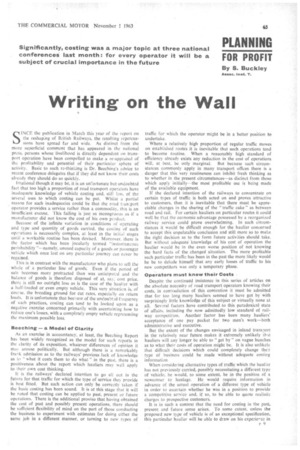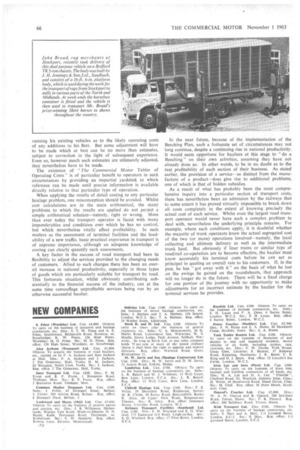Writing on the Wall
Page 67

Page 68

If you've noticed an error in this article please click here to report it so we can fix it.
SINCE the publication in March this year of the report on the reshaping of British Railways, the resulting repercussions have spread far and wide. As distinct from the more superficial comment that has appeared in the national press, persons whose livelihood is directly dependent on transport operation have been compelled to make a re-appraisal of the profitability and potential of their particular sphere of activity. Basic to such re-thinking is Dr. Beeching's advice to recent conference delegates that if they did not know their costs already they should do so quickly.
Irrational though it may be, it is an unfortunate but undoubted fact that too high a proportion of road transport operators have inadequate knowledge of vehicle costing and, still less, of the several uses to which costing can be put. Whilst a partial reason for such inadequacies could be that the road tramport operator provides a service rather than a commodity, this is an insuffic:ent excuse. This failing is just as incongruous as if a manufacturer did not know the cost of his own product.
Because of the infinite variation in conditions of operating and type and quantity of goods carried, the costing of such operations is necessarily complex, at least in the initial stages until a workable routine has been devised. Moreover, there is the factor which has been jocularly termed "instantaneous perishability "—namely, unused capacity of a goods or passenger vehicle which once lost on any particular journey can never be • regained.
This is in contrast with the manufacturer who plans to sell the whole of a particular lihe of goods. Even if the period of sale becomes more protracted than was anticipated and the balance of goods is therefore disposed of at, say; cost price, there is still no outright loss as is the case of the haulier with a half-loaded or even empty vehicle. This very situation is, of course, the breeding ground for cut rates, especially on return loads. It is unfortunate that bec7iuse of the undoubted frequency of such practices, costing can, tend to be looked upon as a negative exercise concerned primarily with ascertaining how to reduce one's losses, with a completely empty vehicle representing the maximum possible loss.
Beech ing — a Model of Clarity As an exercise in accountancy, at least, the Beeching Report has been widely recognized as the model for such reports in the clarity of its exposition, whatever differences of opinion it may arouse politically. But although there is a remarkably frank admission as to the railways' previous lack of knowledge as to what it costs them to do what" in the past, there is a positiveness about the report which hauliers may well apply to their own cost thinking.
It is the railways' declared intention to go all out in the future for that traffic for which the type of service they provide is best fitted. But such action can only be correctly taken if the basic costing has been sound. It is at this stage that it will be noted that costing can be applied to past, present or future operations. There is the additional proviso that having obtained the cost of past and possibly present operations, there should be sufficient flexibility of mind on the part of those conducting the business to experiment with estimates for doing either the same job in a different manner, or turning to new types of traffic for which the operator might be in a better position to undertake.
Where a relatively high proportion of regular traffic moves on established routes it is inevitable that such operations tend to become routine. When a reasonably high standard of efficiency already exists any reduction in the cost of operations
will, at best, be only marginal. But because such circumstances commonly apply in many transport offices there is a danger that this very routineness can inhibit fresh thinking as to whether in the present circumstances—as distinct from those which apply initially—the most profitable use is being made of the available equipment.
If the declared intention of the railways to concentrate on certain types of traffic is both acted on and proves attractive to customers, then it is inevitable that there must be appreciable changes in the sharing of the "traffic cake" as between road and rail. For certain hauliers on particular routes it could well be that the economic advantage possessed by a reorganized railway service could prove overwhelming. In such circumstances it would be difficult enough for the haulier concerned to accept this unpalatable conclusion and still more so to make the right decision as to the form future activities should take. But without adequate knowledge of his cost of operation the haulier would be in the even worse position of not knowing the hard facts of the changed situation. The more profitable such particular traffic has been in the past the more likely Would he be to delude himself that any early losses of traffic to his new competitors was only a temporary phase.
Operators must know their Costs
Despite the continued insistence in this series of articles on the absolute necessity of road transport operators knowing their costs, in contradiction of this contention it must be admitted that for too long many hauliers seemed to have got by with surprisingly little knowledge of this subject or virtually none at all, Several factors have contributed to this paradoxical state of affairs, including the now admittedly low standard of railway competition. Another, factor has been many hauliers' acceptance of one pay packet for two men's work—both administrative and executive.
But the extent of the changes envisaged in inland transport in the relatively near future makes it extremely unlikely that hauliers will any longer be able to "get by" on vague hunches as to what their costs of operation might be. It is also unlikely that difficult decisions which could completely change the:r type of business could be made without adequate costing information When considering alternative types of traffic which the haulier has not previously carried, possibly necessitating a different type of vehicle, he would, to some extent, be in the position of a newcomer to haulage. He would require information in advance of the actual operation of a different type of vehicle in order to ascertain whether he was in a position to provide a competitive service and, if so, to be able to quote realistic charges to prospective customers.
It is in such a context that the need for costing in the past, present and future sense arises. To some extent, unless the proposed new type of vehicle is of an exceptional specification, this particular haulier will be able to draw on his experieece in running his existing vehicles as to the likely operating costs of any additions to his fleet. But some adjustment will have to be made which at best can be no more than estimates, subject to correction in the light of subsequent experience. Even so, however much such estimates are ultimately adjusted, they nevertheless have to be made.
The existence of "The Commercial Motor Tables of Operating Costs" is of particular benefit to operators in such circumstances by providing an impartial yardstick to which reference can be made until precise information is available directly relative to that particular type of operation.
When applying the results of detail costing to any particular haulage problem, one misconception should be avoided. Whilst cost calculations are in the main arithmetical, the many problems to which the results are applied do not _permit a simple arithmetical solution—namely, right or wrong. More than ever today the transport operator is faced with many imponderables and conditions over which he has no control, but which nevertheless vitally affect profitability. In such matters as the assessment of terminal facilities and the loadability of a new traffic, basic practical experience in transport is of Supreme importance, although an adequate knowledge of costing can clearly quantify such assessments.
A key factor in the success of road transport had been its flexibility to adjust the services provided to the changing needs of customers. Allied to such changes there has been an overall increase in national productivity, especially in those types of goods which are particularly suitable for transport by road. This fortunate situation, whilst obviously contributing substantially to the financial success of the industry, can at the same time camouflage unprofitable services being run by an otherwise successful haulier. In the near future, because of the implementation of the Seething Plan, such a fortunate set of circumstances may not long continue, despite a continuing rise in national productivity. It would seem opportune for hauliers at this stage to "do a }leeching" on their own activities, assuming they have not already done so. In other words, to be in no doubt as to the real profitability of each section of their business. As stated earlier, the provision of a service—as distinct from the manufacture of a product—does give rise to additional problems, one of which is that of hidden subsidies.
As a result of what has probably been the most comprehensive inquiry into a particular section of transport costs, there has nevertheless been an admission by the railways that to some extent it has proved virtually impossible to break down all costs completely to the extent of knowing precisely the actual cost of each service. Whilst even the largest road transport operator would never have such a complex_ problem to deal with, nevertheless the underlying principle remains. For example, where such conditions apply, it is doubtful whether the majority of trunk operators know the actual segregated cost of the two (or more) operations involved—namely, the local collecting and ultimate delivery as well as the intermediate trunk haul. But obviously if liner trains or similar type of road/rail co-operation are to become effective, the haulier must know accurately his terminal costs before he can act as principal in quoting an overall rate to his customers. If, in the past, he has "got away with it" on the basis of what he lost on the swings he gained on the roundabouts, that approach will no longer do in the future. There will be a fixed charge for one portion of the journey with no opportunity to make adjustments for an incorrect estimate by the haulier for the terminal services he provides.




































































































